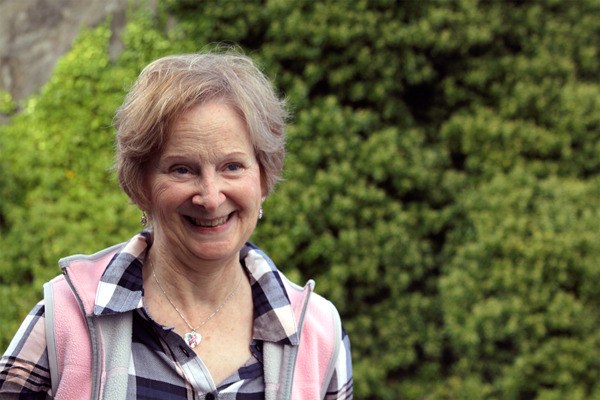When Julie Engstrom received the news that she had breast cancer, she remembers feeling numb.
“It was like my body had betrayed me,” said Engstrom. “I thought, ‘We have no history (in our family), and that is true with many women who are diagnosed with breast cancer. I was healthy.
“Psychologically, it was overwhelming.”
Engstrom, now cancer-free for eight years, sees that overwhelmed look on the faces of others who get similar diagnosises and uses her own life experience to help.
Once a week, she travels from her home in Coupeville to the Providence Regional Cancer Partnership treatment center in Everett.
She’s served as a volunteer staff member in the building’s first-floor cancer resource center for two years, helping others cope with a traumatic life change.
“It’s a devastating diagnosis,” Engstrom said. “We see a lot of people who are just absolutely overwhelmed. They’re traumatized really.”
Engstrom offers more than a comforting smile, she provides hope, insight and lots of information. She said “99.9 percent” of the volunteers who work at the resource center are cancer survivors who’ve traveled down similar paths.
Engstom, 70, said she was fortunate not to have to undergo chemotherapy or radiation treatments after her diagnosis of invasive breast cancer in 2007. A mastectomy was able to rid the cancer from her body.
But the emotional scars ran deep.
She said she saw a psychiatrist for three years to cope with the disease and the aftermath, which included four surgeries.
“She really helped me,” she said of her psychiatrist. “She helped me get a grip on reality.”
Physically, Engstrom is still feeling the effects of her surgeries, which included complications with reconstruction.
She suffers from lymphedema, a condition in which lymph fluid builds up in tissues and causes swelling that results in pressure and discomfort. Her condition impacts her trunk area on the left side of her body where she had surgery.
“It’s known to happen, especially with women who have mastectomies,” Engstrom said. “Unfortunately, it’s just an off-shoot. They don’t know why some women get it and some women don’t.”
Engstrom encourages cancer patients to ask lots of questions. She did that with her doctors after she continued to experience severe pain after her breast reconstruction surgery. Another surgery was performed to remove a long microfiber left inside her that ordinarily doesn’t cause issues in patients but did in Engstrom’s case.
The microfiber is used to help surgeons monitor blood supply to tissues.
“Reconstruction is becoming more knowledgeable to women and, of course, it’s a woman’s choice. It’s always a woman’s choice,” Engstrom said. “But there are a few things they don’t tell you, and it’s important that women know these things so they can ask.”
Engstrom and other volunteers get asked lots of questions at the Cancer Resource Center in Everett.
The volunteers are sometimes called upon by nurses to meet and talk with hospital patients.
They bring new patients gift bags and explain the resources available to them. The center provides new wigs and extensive makeup kits to new patients and offers programs to show them how to apply them.
Oftentimes, a resource center volunteer will bring the gift bag to patients on their first day of chemotherapy.
“That’s when anxiety is so high,” said Kathy Reiff, a patient navigator with the American Cancer Society who’s based at the cancer treatment center in Everett, which opened in 2007. “We visit and give them a gift, and it gives them an opportunity to relax a little bit. Many of the volunteers are cancer survivors, so when they say that, it gives them a little hope and grounding.”
Many patients don’t have support in their lives and the volunteer family becomes that support, Reiff said.
“Julie is really outgoing and very comforting,” Reiff said. “She has a lot of people who come just to see her.”
It is Engstrom’s way of giving back.
She empathizes with patients, understanding the journeys they’ve traveled. She said she’s grateful for the support from her husband Joe Engstrom, who’s been “by her side” to all of her own appointments and surgeries.
Julie Engstrom is also a volunteer with the American Cancer Society’s Road to Recovery Program and is involved with Relay for Life.
Volunteers in the Road to Recovery program drive patients to and from their doctor appointments.
Engstrom was awarded the Linda Lee Martens Memorial Health Hero of Island County Award in May.
“I wanted to help other cancer survivors,” she said. “I wanted to assist them on their journey. It’s a lonely journey. Now more people have better support because there’s more information out there about cancer.”
Any part she can play is rewarding and keeps her going back to Everett once a week.
“It’s always nice to speak with somebody who has been on the journey,” Engstrom said. “Although it’s always different, the journeys have similarities. They will open up to us where they might not to someone else.”



